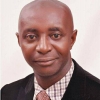Eneojoherbert
Others : Iam A Journalist, Marketing Specialist And A Brand Promoter
Articles
50
Followers
7
profile/9885234816581830720190327_081824.jpg
Eneojoherbert
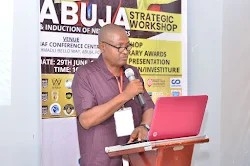
Dr Valentine Opaluwa Ejeh
VALENTINE OPALUWA EJEH BAGS DOCTORATE FELLOW IN CORPORATE AND STRATEGIC RESEARCH
~2.8 mins read
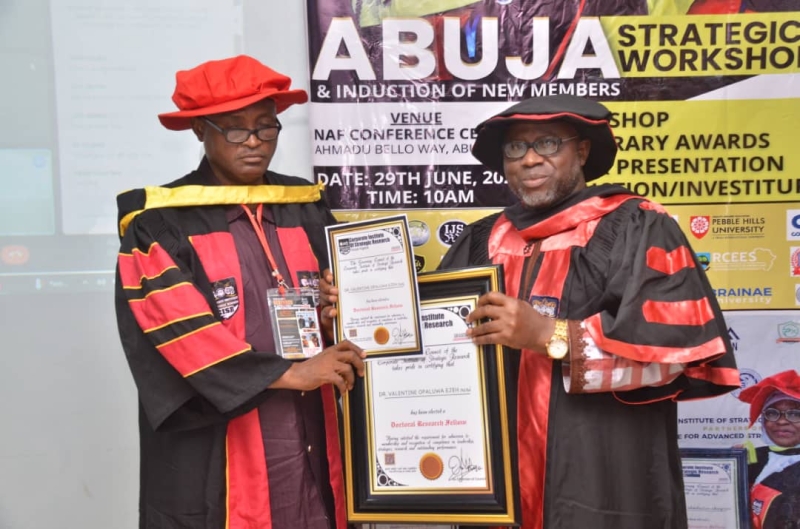
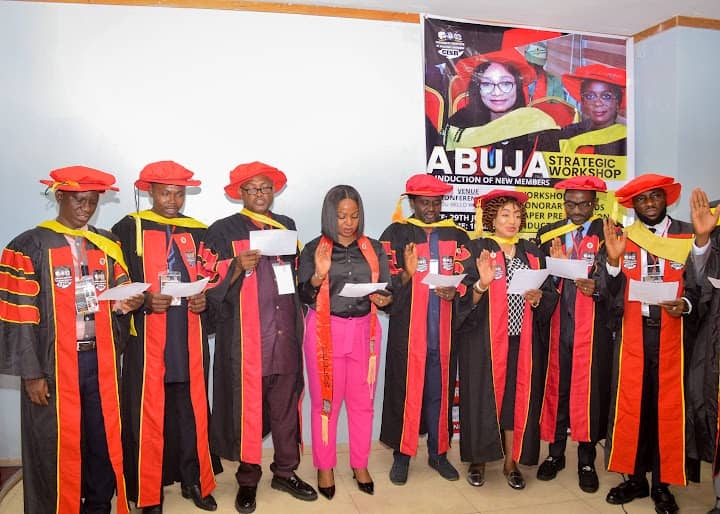
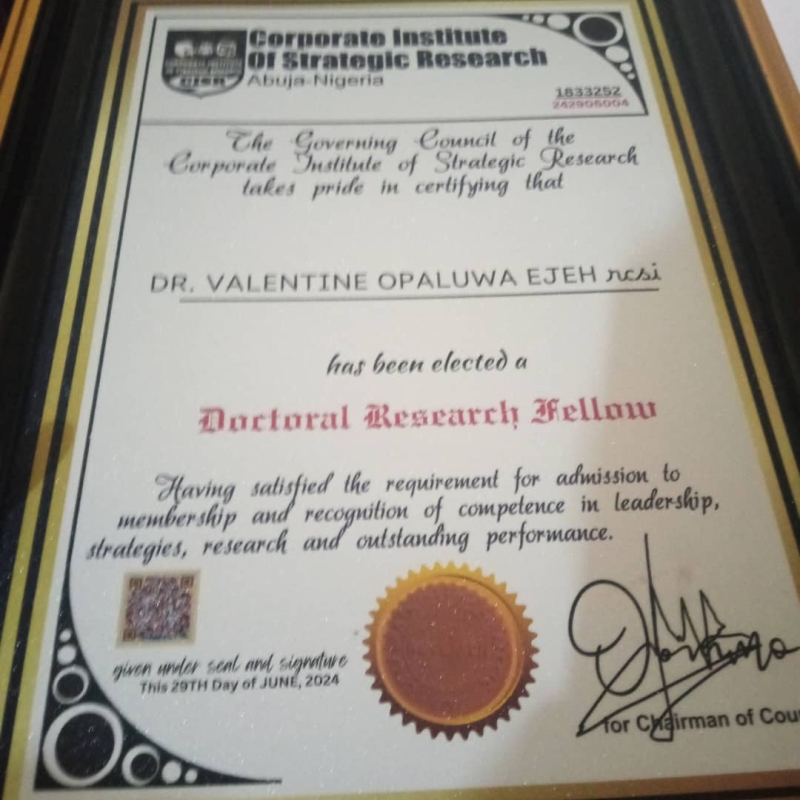
Frontline writer, researcher, documenter, and biographer Dr. Valentine Opaluwa Ejeh has been elected as a Doctoral Research Fellow by the board of trustees of the Corporate Institute of Strategic Research in Abuja. This prestigious recognition comes as Dr. Ejeh has satisfied the stringent requirements for admission to the membership and has demonstrated exceptional competence in leadership, research, and outstanding performance.
The election took place on June 29th, 2024 at the NAF Conference center in Abuja, the Nigerian capital, marking a significant milestone in Dr. Ejeh’s illustrious career.
His election as a Doctoral Research Fellow was affirmed after the submission and presentation of a paper titled: Security, Peace and Stability: The Antidote to Economic Growth in Nigeria.
His election is a testament to his extensive contributions to the fields of writing and documentation, as well as his notable achievements in biographical research.
Dr. Ejeh’s work has long been recognized for its depth, clarity, and impact, making him a respected figure in academic and literary circles. His ability to blend meticulous research with engaging storytelling has earned him accolades and solidified his reputation as a leading biographer in Nigeria and beyond.
Dr Ejeh is the publisher of National Ethics and Values Research Journal, Chief Operating Officer of Pencraft Books, a research, writing, documentation and publishing firm based in Abuja, the Senior Research Assistant Apex Security and Safety Consultancy.
He is a sought after researcher and writer. He has authored many books including: The Jewel of Our Generation; The Feast of Wits and prominently; Africa's Search for the Holy grail of Football. He is also co-author; The Man of the Masses, Standing Out in the Crowd-The biography of late Senator Dr. Chief Alex Usman Kadiri, A Discourse On the Political Life of President Bola Ahmed Tinubu, Lifelong Ambition of President Bola Ahmed Tinubu among others. His fourth-coming well researched academic book titled: War, Insurgency, Terrorism and Network for Peace has received raving review from academics and military scholars amongst whom is Nigerian Army Resources Centre Abuja, Department of Transformation and Innovation, Office of the Chief of Defence Staff, Major Gen. Garba Audu, Nigeria Defence College among others.
Dr Ejeh is a UN-POLAC ECOSOC Peace Ambassador and member of the Discussion Group on Religion, Conflict and Peace, School of Divinity, Harvard University, Massachusetts USA.
He earned Postgraduate Professional Diploma in Peace and Conflict Management from Blessed Cosmopolitan College UK. He is pursuing a Doctoral (PhD) Degree in Peace and Conflict Management at Freedom University & Seminary College, Pottstown, USA.
In accepting this honor, Dr. Ejeh expressed his gratitude to the Corporate Institute of Strategic Research and its board of trustees for the recognition of his research works and rewarding him with Doctoral Research Fellowship of the world reputable institute. "I will do everything to justify the confidence reposed in me by proferring solutions to humanity problems through critically thinking outside the box and innovative research." He also called on the President Bola Ahmed Tinubu and policy makers to think outside the box by evolving mitigating strategies to assuage the plight of the citizenry in the face of the present harsh economic reality in Nigeria.
He highlighted the importance of research and documentation in preserving history and advancing knowledge ultimately towards nation building, and he reaffirmed his commitment to these endeavors.
The Corporate Institute of Strategic Research in Abuja is renowned for its dedication to promoting strategic research and leadership excellence.
The election of Dr. Ejeh as a Doctoral Research Fellow underscores the institute’s commitment to recognizing and supporting individuals who have made significant contributions to their fields.
As Dr. Ejeh embarks on this new chapter as a Doctoral Research Fellow, his election serves as an inspiration to other researchers and writers, demonstrating the value of dedication, excellence, and a commitment to advancing knowledge. The event in Abuja not only celebrated Dr. Ejeh’s achievements but also highlighted the ongoing importance of strategic research in shaping Nigeria’s future.
profile/9885234816581830720190327_081824.jpg
Eneojoherbert
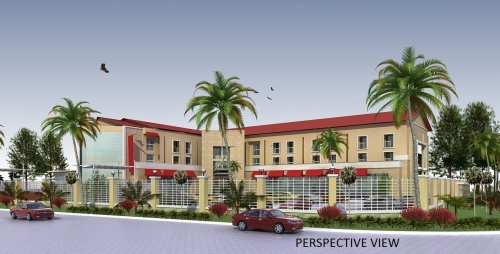
IDAH CLUB 6575 TO ORGANISE FUND RAISING FOR THE REMODELLING OF IDAH CLUB AND OTHER PROJECTS
~4.1 mins read
Idah Club
6575, a social, non-partisan and elitist club with membership of intellectual
like minds, is making arrangements to rebuild and remodel IDAH CLUB, a Multi-racial,
Multinational and cosmopolitan club house situated in the ancient city of Idah,
headquarters of the defunct Igala Native Authority, the current headquarters of
Idah LGA, the traditional and ancestral home of the Igala people and the
melting point of Igala civilization.
The chairman
of the fund raising committee, Hon. Paul Ogwu Ukwenya, gave this indication in
a chat with our correspondent recently. He enumerated other projects that the
club is raising funds to implement such as the Establishment of Community Radio
station, ICT/Vocational/Entrepreneurial center (including e-library) annual
Educational Scholarship program, Annual Free Health care Intervention scheme,
Sports Intervention, Promoting Cultural Heritage and Agricultural Intervention.
Hon Ukwenya
said that the club has been very committed to fostering peace, development and
wellbeing of the Igala people, specifically the Idah federal constituency
through its various intervention projects since inception, and is this time around taking those developmental
efforts to the next level by opening its doors to corporate organizations, Non-Governmental
Organizations, high net-worth/ public spirited individuals and philanthropists
to join the club in its different development projects aimed at improving the lot and wellbeing of the people and ultimately engender
development.
With
planning in top gear, the all-important Fund raising Dinner is expected to hold
on the 6th of December 2021 at the Banquet hall of Chida International
Hotel, Jabi Abuja at 4pm prompt.
The Club is
aiming to raise the sum of 500 million Naira (N500,000,000.00) to be spread
among the various projects being envisioned.
According to
Hon Ukwenya, “The various Projects put together are meant for those who have
the heart to pull resources together for common wellbeing”.
One of the
projects is the Re-modeling of Idah Club to a modern befitting state of the art,
Avant garde edifice meant to replicate the likes of Ikoyi club and others. “Idah Club is a legacy bequeathed to us by the
founding Fathers and we will not let their dream die but rather, we are taking
it to the next level from where they stopped”. The new complex, according to
him, will include a Club House, a 30 Room Lodging facility, a swimming Pool, a
Banquet Hall, a Sports center which includes a Gym/ Fitness Center, an Indoor
sports Hall (Table Tennis, Snooker, Chess, Draught etc) a Lawn tennis court,
Hand ball, Basketball/Volleyball court, Squash court etc.
He said the
project when completed will not only restore the Cosmopolitan glory of the city
of Idah, but also engender Igala tourism development and give Igala land a
global outlook, showcasing the Igala people as a super race.
He decried
the non-availability of a standard lodging facility in the ancient city of Idah,
a cultural and tourism nerve center and home of the Igala people and emphasized
the misnomer as one of the gaps to be filed by the project. He
therefore called on all well-meaning persons of Igala extraction both at home
and in the Diaspora, the friends and well-wishers of the club, the political
class, the elite and business community, Cultural and Socio-political
Organizations, Non-Governmental organizations, donor agencies, to rise up and
join others in pooling resources together to make this project a reality.
Idah club 6575 was
established on the 31st October, 2018 by Chief Samuel Ogali, the founder and
Current president, the Maiden Reunion was held on the 26th December, 2018 at
Igalamela/odolu Guest Inn.
During deliberation
at the reunion, opinion was raised on the name and it was unanimously agreed
that the body be known, called and addressed as Idah Club 6575.
The club has its motto as “Udama, Uredo Kpai Unyogba”. It is a
social, non-partisan club with membership drawn from those born in the local Government areas of the Idah
Federal Constituency, namely Idah, Ofu, Igalamela/Odolu and Ibaji, between
1965-1975. A world class club with membership spread across major cities in
Nigeria and in the diaspora.
The Club parades a retinue of High net-worth personalities of
famed Corporate and Social standing on its membership, on the executive
committee headed by the President, Chief Samuel Ogali, and on its Board of
Trustees, under the chairmanship of Chief Charles-Lwanga Okwoli.
The main purpose of the club is to foster unity, peace and
development in Idah and also to synergize, collaborate and partner with Government,
private institutions and individuals to bring the much needed socio-economic
development through community service to Idah and Igala land in general.
In terms of the Club’s achievements include but not limited to
the following; The Club has been able to come out firm on Peace Advocacy,
during the last general election in April, 2019, IC6575 Peace Advocacy posters
were pasted everywhere in Idah. Similarly, during the Kogi State gubernatorial
election in November, 2019, the Club’s Peace Advocacy messages were on Amikad
Bill Boards in the heart of Lokoja and Anyigba respectively, and the posters
were also everywhere in Idah.
27th December, 2019, on the 27th to be precise,
the Club’s Medical Team, embarked on Free Medical Outreach and it was a huge
success.
Also The Club’s Education Committee went to the field and
registered 50 indigent students for 2020 JAMB, it has also selected Ten (10)
Secondary Schools in Idah. The eight secondary schools’ principals will select
5 each of indigent but brilliant students annually for the Club to get them
registered.
In the area of security, the Club has been dialoguing with Nigerian Police on how to find
a lasting solution to social vices like; Thuggery, Armed robbery, Kidnapping,
Juvenile delinquency, cultism etc. The Club has in its kitty, blueprints of
projects to be executed on short term, Medium term and Long term basis.
No doubt, Members of Idah Club 6575 are determined to
change the ugly narratives in the ancient city of Idah through collective and
deliberate efforts towards restoring the lost glory of the ancient City.
Advertisement

Link socials
Matches
Loading...
